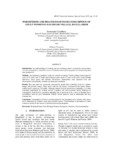| dc.contributor.author | Chaudhury, Sumangala | |
| dc.contributor.author | Yeasmin, Sultana | |
| dc.date.accessioned | 2016-04-21T12:42:32Z | |
| dc.date.available | 2016-04-21T12:42:32Z | |
| dc.date.copyright | 2012 | |
| dc.date.issued | 2012-12 | |
| dc.identifier.citation | Chaudhury, S., & Yeasmin, S. (2012). Perceptions and practices of food consumption of adult women in Bagnibari village, Bangladesh. BRAC University Journal, Special Issue, 31-41. | en_US |
| dc.identifier.issn | | |
| dc.identifier.issn | 1811-3079 | |
| dc.identifier.uri | http://hdl.handle.net/10361/5180 | |
| dc.description | Includes bibliographical references (page 41). | en_US |
| dc.description.abstract | Introduction: An understanding of working and non-working women’s perceptions and practices of food consumption is crucial for success of nutrition intervention programs by incorporating their emic perspective.
Methods: An exploratory qualitative study was carried out among 7 adult working women (aged 15 years to 35 years) and 11 adult non-working women (aged 17 years to 60 years) using in-depth interviews, focus group and informal discussions, participatory rural appraisal tools and observations in households, roadside tea-shops and restaurants.
Results: Rice and potato are commonly consumed by people. Rice symbolizes food as it reduces hunger and provides energy. Three meals with rice are usually consumed by the family. Home-cooked food is perceived as healthy. Although market food are perceived as unhealthy, it is often consumed, particularly by working women. Cognitive and socio-economic factors influence its consumption. Stale food is considered unhealthy and is perceived to be a cause of diarrhea but is nevertheless eaten by poor households. Elderly women perceive food as adulterated and they consume less.
Conclusion: Consumption of food is not determined by the perception of its nutrient value alone, but is influenced by cultural, social and economic factors. Understanding of perceptions of adult women is crucial for the success of nutrition intervention programs. | en_US |
| dc.description.statementofresponsibility | Sumangala Chaudhury | |
| dc.description.statementofresponsibility | Sultana Yeasmin | |
| dc.format.extent | 11 pages | |
| dc.language.iso | en | en_US |
| dc.publisher | BRAC University | en_US |
| dc.rights | BRAC University Journals are protected by copyright. They may be viewed from this source for any purpose, but reproduction or distribution in any format is prohibited without written permission. | |
| dc.subject | Working women | en_US |
| dc.subject | Non-working women | en_US |
| dc.subject | Perceptions | en_US |
| dc.subject | Practices | en_US |
| dc.subject | Food consumption | en_US |
| dc.title | Perceptions and practices of food consumption of adult women in Bagnibari village, Bangladesh | en_US |
| dc.type | Article | en_US |
| dc.contributor.department | James P Grant School of Public Health, BRAC University | |

